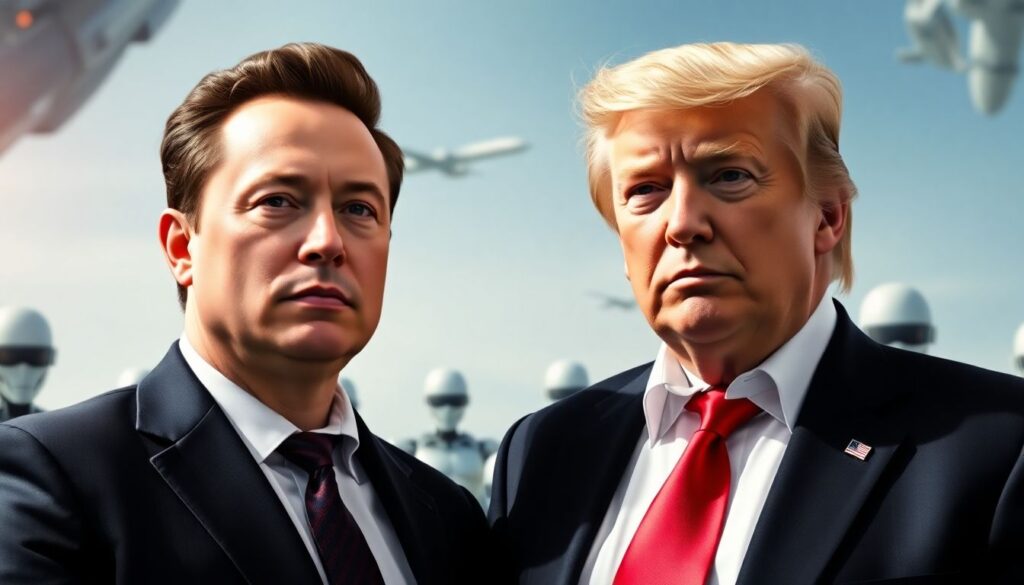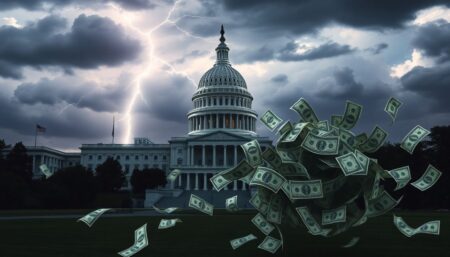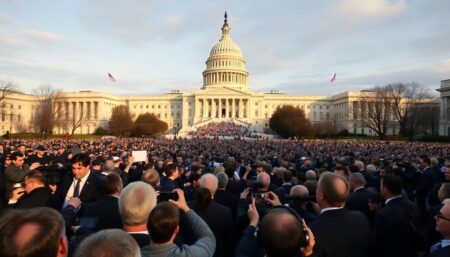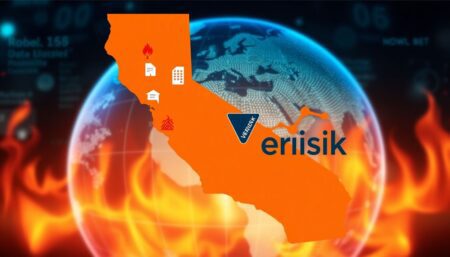Welcome to this captivating exploration of the intersection between politics, technology, and ideology. In this article, we delve into the fascinating alliance between Donald Trump and Elon Musk, examining how their combined influence could reshape the political landscape of the United States. Join us as we unravel the threads of techno-libertarianism, the role of AI, and the potential impacts on US democracy.
Exploring the intersection of politics, technology, and ideology in the Trump-Musk alliance.
Imagine stepping into a scene straight out of a science fiction epic, where the titans of politics and technology converge in a spectacular futuristic landscape. Here stands Elon Musk, the visionary entrepreneur known for his boundary-pushing innovations, alongside Donald Trump, the former president and business mogul, symbolizing an unprecedented fusion of political influence and techno-libertarian ideals.
The backdrop is a mesmerizing tableau of advanced technology—sleek robotic figures glide effortlessly, holographic interfaces dance in the air, and futuristic cityscapes stretch as far as the eye can see. This setting embodies a world where the lines between politics and technology blur, and the future is shaped by those who dare to dream big and act boldly.
This image encapsulates a pivotal moment in history, where the ambitions of Silicon Valley meet the corridors of power in Washington. It’s a visual representation of a potential future where technological advancements and political strategies intertwine, creating a new paradigm of leadership and innovation. Whether you see it as a utopian vision or a cautionary tale, this scene undeniably sparks conversation and contemplation about the trajectory of our society.
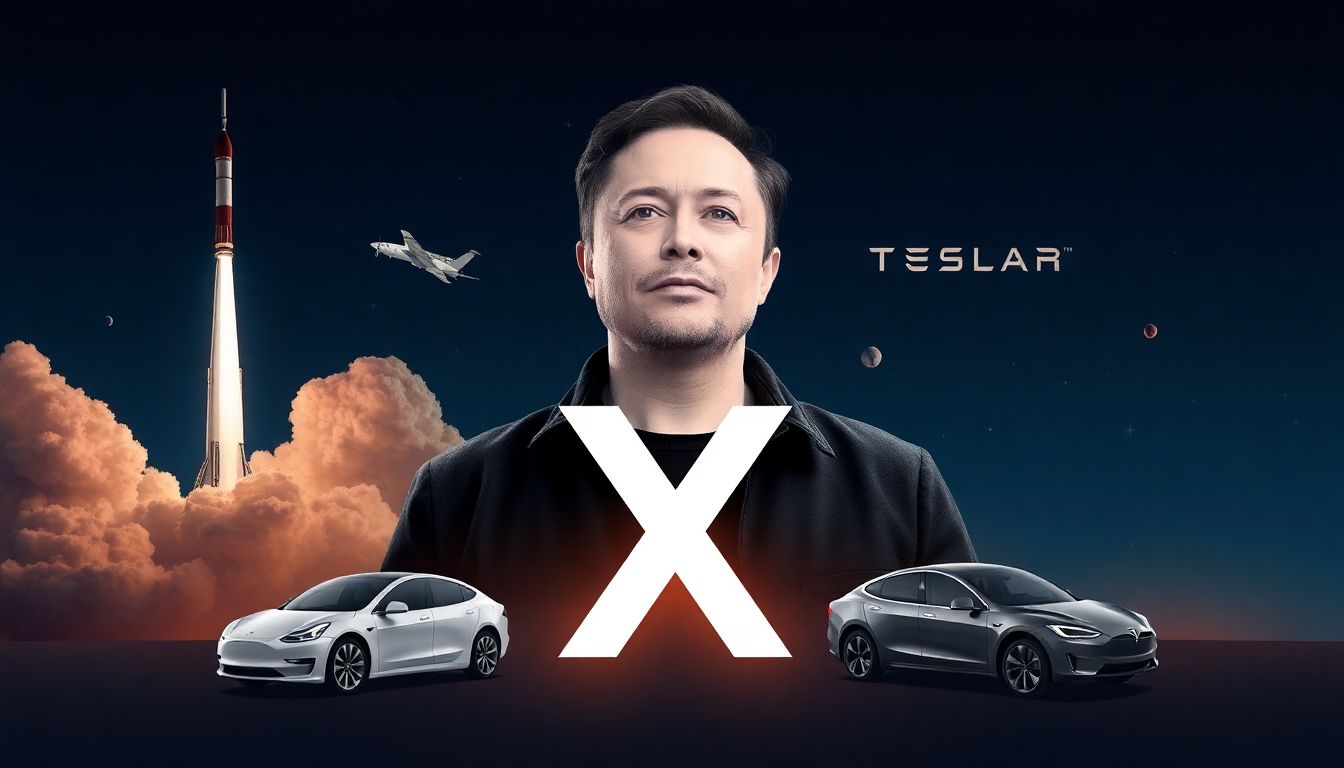
The Rise of Elon Musk
From a young age, Elon Musk showed signs of precocity. Born in South Africa, Musk taught himself computer programming at the age of 10. By the time he was 12, he had already created and sold his first video game, Blastar. This early achievement set the stage for a lifelong journey of innovation and entrepreneurship.
Musk’s path to becoming the world’s richest man is marked by several major achievements. After co-founding and selling PayPal, he went on to revolutionize multiple industries. He is perhaps best known for SpaceX, which has significantly lowered the cost of space travel and has become a key player in the aerospace industry. Additionally, Musk’s involvement with Tesla has accelerated the world’s transition to electric vehicles, making them more accessible and desirable. Here are some of his notable accomplishments:
- Co-founded Zip2, which was sold for over $300 million
- Co-founded PayPal, which was sold to eBay for $1.5 billion
- Founded SpaceX, which has successfully launched and landed reusable rockets
- Joined Tesla as Series A round investor and later assumed leadership as CEO
His achievements have not only propelled him to immense wealth but have also earned him a reputation as a visionary, pushing the boundaries of technology and innovation.
In addition to his business ventures, Musk has always been vocal about his vision for a better future. He has proposed ideas like Hyperloop, a high-speed transportation system, and Neuralink, a company aiming to integrate the human brain with AI. His advocacy for a multiplanetary life has led SpaceX to develop Starship, a spacecraft designed to carry humans to Mars.
Now, Musk is set to take on a new challenge as the head of the Department of Government Efficiency (DOGE). In this role, he aims to streamline government processes and increase efficiency. This move is not just a career shift, but an opportunity for Musk to apply his innovative thinking and problem-solving skills to the public sector. It remains to be seen what changes Musk will bring to the table, but his track record suggests that significant improvements could be on the horizon.
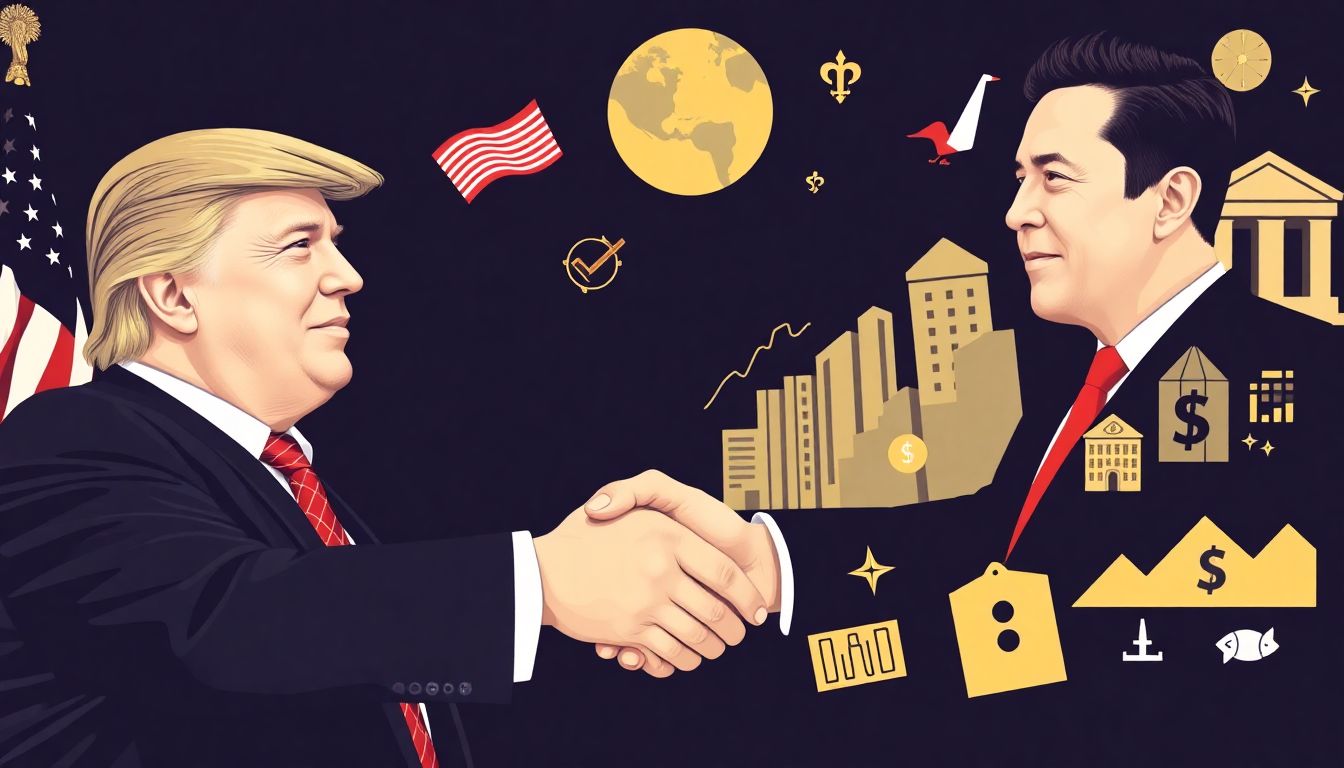
The Trump-Musk Alliance
The political alliance between Donald Trump and Elon Musk is a fascinating study in power dynamics. Musk, a titan of industry with a vast fortune and considerable influence, emerged as an unlikely supporter of Trump during the 2016 presidential campaign. His endorsement was not merely symbolic; it carried significant weight. Musk’s public approval lent Trump a sense of credibility, particularly among tech-savvy voters and those impressed by Musk’s entrepreneurial prowess. Moreover, Musk’s companies, notably Tesla and SpaceX, are seen as beacons of innovation and job creation, aligning with Trump’s campaign promises to boost the economy and create jobs.
Musk’s influence extended beyond the campaign trail and into the incoming Trump administration. He was appointed to several advisory councils, including the Strategic and Policy Forum and the Manufacturing Jobs Initiative. These positions gave Musk direct access to the president and his inner circle, allowing him to advocate for policies that benefited his companies. Notably, Musk’s advocacy for a more business-friendly regulatory environment dovetailed with Trump’s agenda. Some of the key areas where Musk’s influence was felt include:
-
Space Exploration:
Musk’s SpaceX benefited from Trump’s support for private space initiatives and increased funding for NASA.
-
Energy and Environment:
Despite disagreements on climate change, Musk’s Tesla saw opportunities in the administration’s focus on energy independence and infrastructure development.
-
Trade and Manufacturing:
Musk’s advocacy for fair trade practices and domestic manufacturing aligned with Trump’s protectionist stance.
However, the Trump-Musk alliance was not without its tensions. Musk’s public disagreements with Trump, particularly on issues like climate change and immigration, highlighted the limits of their partnership. Musk’s decision to step down from Trump’s advisory councils following the president’s withdrawal from the Paris Agreement illustrated his willingness to challenge the administration. This dynamic underscores the complex nature of their relationship, where economic and political interests intersect but do not always align perfectly.
In conclusion, the Trump-Musk alliance offers a compelling case study in the intersection of political and economic power. Musk’s endorsement and advisory roles contributed to Trump’s electoral success and influenced the administration’s policies. However, their differing views on critical issues also demonstrated the boundaries of their partnership, revealing a nuanced and multifaceted relationship that transcends simple categorization.
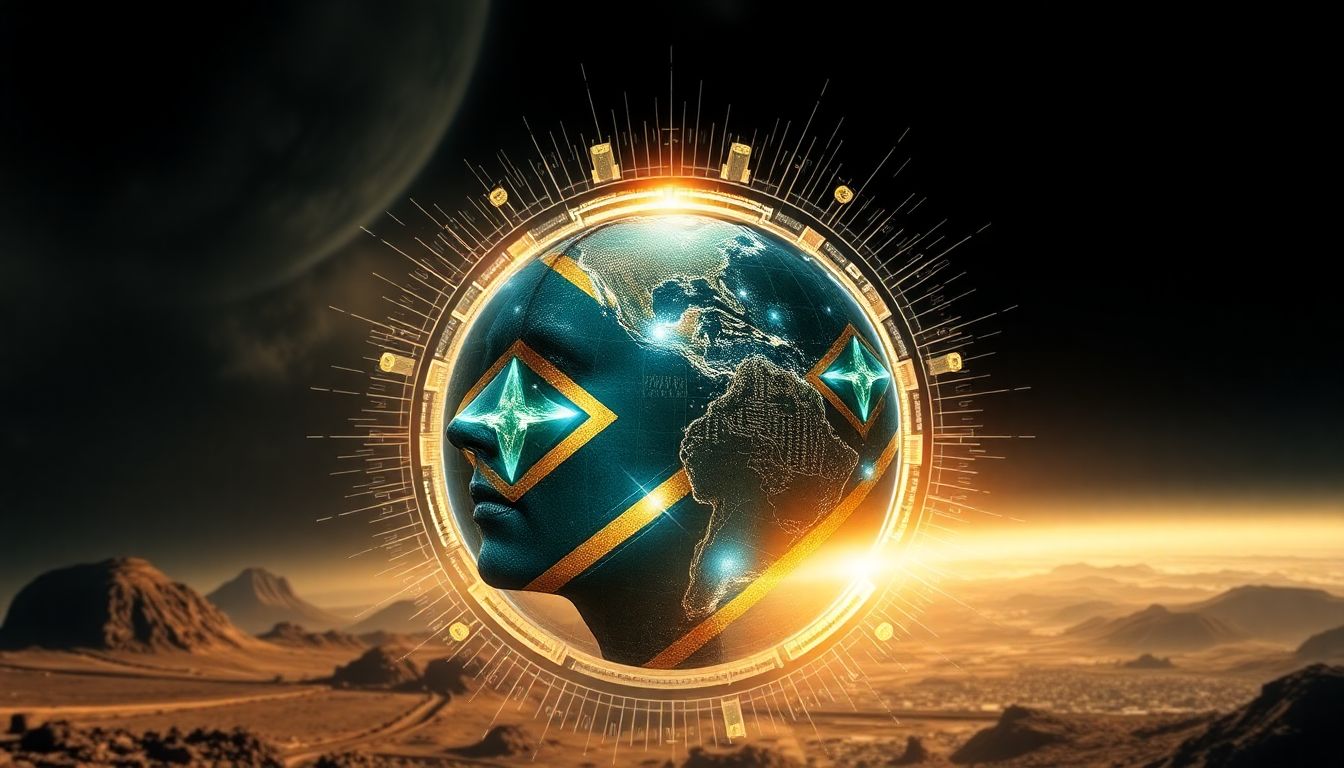
Techno-Libertarianism and Its Origins
Techno-libertarianism, a political ideology that combines libertarian philosophy with a strong faith in technology, has its roots in the counterculture movements of the 1960s and 1970s. It emerged from a blend of California’s cybernetic culture and the libertarian ideals of individual freedom, limited government, and free-market economics. Early techno-libertarians saw technology as a means to create a more open, decentralized society, free from the constraints of traditional political and economic systems.
The ideology’s connection to Apartheid South Africa is a more complex and controversial chapter. In the late 1970s and early 1980s, some libertarian thinkers, notably from the Cato Institute, saw South Africa as an example of a small-government, free-market economy, overlooking or downplaying the brutal realities of apartheid. This association, though not universally supported within the libertarian movement, left a lasting stain on the ideology’s history.
Elon Musk, the billionaire entrepreneur behind companies like SpaceX and Tesla, is often associated with techno-libertarianism. Here’s how this ideology shapes his worldview and policies:
-
Individualism and Anti-Collectivism:
Musk often emphasizes the power of the individual over collective action. He believes in the individual’s ability to drive progress and innovation, a theme that resonates strongly in his companies and personal projects.
-
Deregulation:
Musk has repeatedly advocated for reduced regulatory oversight, aligning with the libertarian principle of minimal government intervention. He believes this approach fosters innovation and accelerates technological advancement.
-
Multiplanetary Life:
Musk’s vision for a multiplanetary future aligns with techno-libertarianism’s faith in technology as a solution to societal problems. He sees space colonization as a way to ensure the long-term survival of the human species.
However, Musk’s interpretation of techno-libertarianism is not without its critics. Some argue that his approach overlooks the potential negative consequences of unregulated technology and ignores the systemic issues that can’t be solved by individual action alone. Moreover, his past associations with South Africa, his birthplace, have drawn scrutiny, though Musk has publicly condemned apartheid and emphasized his commitment to a more inclusive future.

The Future of US Democracy
The potential alliance between former President Donald Trump and tech mogul Elon Musk has sparked a whirlwind of speculation and concern about its impacts on U.S. democracy. With Musk’s acquisition of Twitter, the platform that has long been Trump’s preferred method of communication, the political landscape could be primed for significant shifts. The most immediate impact could be the return of Trump to the platform, following his controversial ban in 2021. This move could reinstitute his influence over public discourse, potentially polarizing political conversations even further.
The role of private corporations in shaping political narratives is underscored by this alliance. Musk’s advocacy for free speech absolutism, combined with Trump’s political influence, could transform Twitter into an even more potent tool for political messaging. This dynamic raises several questions: Should private corporations have such significant influence over political discourse? What are the implications for democracy when tech platforms can dictate who has a voice and who does not? The answers to these questions could reshape how we understand the intersection of technology, politics, and free speech.
However, Musk may face several challenges in navigating this alliance. Here are a few key hurdles he might encounter:
-
Content Moderation:
Balancing free speech with the need to curb misinformation and hate speech will be a tightrope walk for Musk.
-
Public Perception:
The alliance could alienate certain segments of Twitter’s user base, potentially leading to a loss of users and advertiser backlash.
-
Regulatory Scrutiny:
Lawmakers may increase scrutiny on Twitter’s policies and practices, adding further complexity to Musk’s management of the platform.
Moreover, the long-term effects of this alliance on U.S. democracy are uncertain. While it could foster more open and unfiltered political discussions, it also risks amplifying divisive rhetoric and misinformation. As Musk steers Twitter into uncharted waters, the future of political discourse in the digital age hangs in the balance. The outcomes of this alliance will undoubtedly shape how we understand the role of social media in democracy and the responsibilities of those who control these powerful platforms.
FAQ
What is techno-libertarianism?
How did Elon Musk contribute to Trump’s electoral success?
What is the Department of Government Efficiency (DOGE)?
What are the potential challenges Musk may face in implementing his agenda?
- Balancing his vision of a small state with the Trump administration’s plans to enlarge the state’s ambit through tariffs and subsidies.
- Navigating his ‘pro-China’ tilt amidst increasing US-China rivalry and the presence of China-hawks in the Trump administration.



